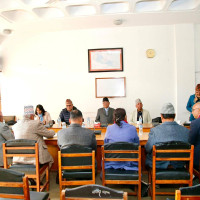- Monday, 26 January 2026
Herbal medicine primary source of income for Himalayan residents
By Jayman Budhamagar,Rukum East, Aug. 16: The collection and sale of herbal medicines have become a primary source of income for the residents of the upper regions of Rukum East.
The areas including Putha Uttarganga, Bhume, and Sisne Rural Municipalities are rich in various medicinal herbs, making them vital for the local economy.
Jitendra Singh Khadka, Chief of the Division Forest Office in Rukum East, said that herbs are found in abundance across all 14 wards of Putha Uttarganga, all nine wards of Bhume, and Ward Nos. 1 and 2 of Sisne Rural Municipality. Some herbs are also available in the remaining wards, although not as plentiful.
Due to the high altitude and harsh terrain, these regions produce very little agricultural output. In some areas, only one crop is harvested annually, making herbal medicine the primary source of income for the local communities. Residents rely on the forest to collect these herbs, which they sell for their livelihood.
Namendra Sunar from Putha Uttarganga-14 shared that locals often spend their days in the forests collecting herbs like yarsagumba, kutki, bhutle, panchaunle, red mushrooms, gucche mushrooms, and various other valuable species. The herbs are collected and sold throughout the year, providing a steady source of income.
Ranger Bishwo KC of the Division Forest Office highlighted that the market value of these herbs is high, with prices ranging from Rs. 1,000 per kilogram for common herbs to Rs. 2.2 million per kilogram for yarsagumba. This lucrative trade has significantly improved the living standards of the locals.
The revenue collection from the harvesting of these herbs is relatively low, with a revenue of Rs. 20 per kilogram for wild honey and Rs. 31,000 per kilogram for yarsagumba.
Traders purchase wild honey from locals at Rs. 1,000 per kilogram and yarsagumba at prices ranging from Rs. 600 to Rs. 1,200 per piece.
In the fiscal year 2023/24, Rukum East exported 125,257 kilograms of various medicinal herbs, generating Rs. 2.3 million in revenue.
Ranger KC also said that cultivating herbs in farmlands could further increase the income of locals. Recently, many farmers have started focusing on herbal cultivation, recognising its potential for higher earnings.















